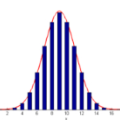Stein Variational Gradient Descent (SVGD) is a nonparametric particle-based deterministic sampling algorithm. Despite its wide usage, understanding the theoretical properties of SVGD has remained a challenging problem. For sampling from a Gaussian target, the SVGD dynamics with a bilinear kernel will remain Gaussian as long as the initializer is Gaussian. Inspired by this fact, we undertake a detailed theoretical study of the Gaussian-SVGD, i.e., SVGD projected to the family of Gaussian distributions via the bilinear kernel, or equivalently Gaussian variational inference (GVI) with SVGD. We present a complete picture by considering both the mean-field PDE and discrete particle systems. When the target is strongly log-concave, the mean-field Gaussian-SVGD dynamics is proven to converge linearly to the Gaussian distribution closest to the target in KL divergence. In the finite-particle setting, there is both uniform in time convergence to the mean-field limit and linear convergence in time to the equilibrium if the target is Gaussian. In the general case, we propose a density-based and a particle-based implementation of the Gaussian-SVGD, and show that several recent algorithms for GVI, proposed from different perspectives, emerge as special cases of our unified framework. Interestingly, one of the new particle-based instance from this framework empirically outperforms existing approaches. Our results make concrete contributions towards obtaining a deeper understanding of both SVGD and GVI.
翻译:暂无翻译




